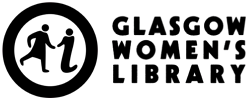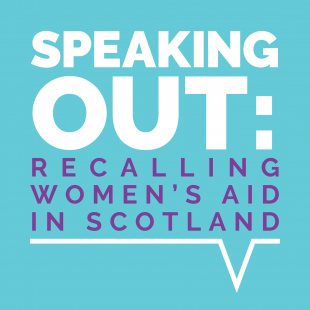Hello and thank you for reading the very first blog post of the Speaking Out project! In this post I’d like to give an introduction to the project and what my role in it will be.
Speaking Out: Recalling Women’s Aid in Scotland aims to record and celebrate the history of the Women’s Aid movement across the country. We’ll do this in the following ways: by recording interviews with up to 100 people who have a connection to Women’s Aid; by developing an archive of Women’s Aid history at Glasgow Women’s Library; by creating an online archive and learning resources; producing a touring exhibition and publication; and holding events across Scotland.
I’ve been in post as the project Engagement Officer since mid-December. My role focuses on communicating the project and its findings to the widest possible audience. My tasks will include working with volunteers to produce a touring exhibition, developing the website content, creating learning resources, and organising a celebratory event. I also support the work of the other members of the project team: Sarah, the Project Coordinator; and Nicola and Amy who are the Project Archivists.
Since starting work on this project I’ve had the inevitable questions about what my job is. Having previously spent three years working for a prison arts charity I’m used to people being somewhat baffled by the answer to this question. In this case I think the title ‘Engagement Officer’ coupled with the explanation, ‘Oh I’m working on a project that will record and celebrate the history of the Women’s Aid movement’ has led some people I know to wonder why I’ve never managed to get a proper job. One friend replied ‘Sounds like you’re finding out people’s family history, but just women?’
That reply may shock some people who have a close connection to Women’s Aid or who have a good knowledge of women’s history in Scotland. However I think that actually many people in Scotland have no idea what Women’s Aid is or how it came about. In fact, I’ll let you in on a secret: before I applied for this job I didn’t really know anything about how Women’s Aid was set up or what it does today. And I call myself a feminist. I also have a degree in history.
However, since starting this role I’ve become fascinated by the history of Women’s Aid in Scotland and how the movement has not only provided practical support to women and children experiencing domestic abuse, but has been successful in campaigning for legal change, funding and, moreover, in changing perceptions of the issue. I’ve come to utterly admire the women who took time out of their lives to form groups, write to politicians, raise funds and complain when newspaper articles and court cases showed sympathy towards male perpetrators of violence against women.
The Women’s Aid movement played an instrumental role in putting domestic abuse on the political agenda. In doing so, this contributed to the fact that in Scotland we are in the unique position in the UK of having a government that recognises domestic abuse as cause and consequence of gender inequality. Scotland now has one of the most progressive legal and political frameworks in the world when it comes to addressing violence against women.
However, domestic abuse is far from being a historic issue. Local Women’s Aid groups report a higher demand for their service than ever before. On any given day in Scotland over 1,000 women and children receive support from Women’s Aid groups. Therefore whilst much has been achieved by the Women’s Aid movement, domestic abuse is still prevalent, and so the services provided by local groups are still very much needed.
I hope that the Speaking Out project will raise awareness not only of the pioneering women who set up and ran Women’s Aid groups, but also of those who continue to support women and children who need their help, and to highlight the very current and ongoing issue of domestic abuse. My aim on this project is to do all of these things, and I hope this contributes in some small way to a greater recognition of the women involved in the movement, and to more understanding about domestic abuse today.
Then, hopefully, in ten years’ time when Scottish Women’s Aid is updating this project for their 50th anniversary, my future successor will have a much easier time explaining what their job is all about.
For project updates follow us on Twitter @SpeakingOut_SWA.


Comments are closed.